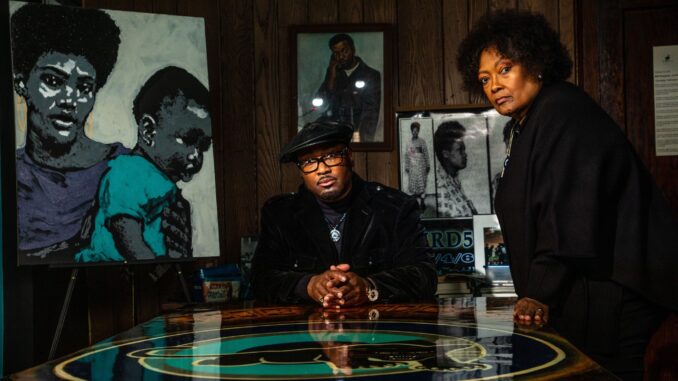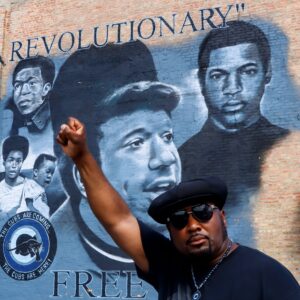
By Vincent Williams
On December 4, 1969, the U.S. government and the Chicago Police Department assassinated Chairman Fred Hampton, Sr. During the wee hours of the morning, approximately 4:30 a.m., a group of law enforcement officers from multiple jurisdictions, Chicago police officers, Cook County State’s Attorney police officers, and FBI agents, kicked in the doors at 2337 West Monroe St., on Chicago’s Westside, and sprayed with gunfire the apartment inhabited by Hampton and his fiancée, Deborah Johnson, an expectant mother carrying his child, as they lay asleep in bed. Acting under the direction and orders of J. Edgar Hoover, Director of the U.S. Federal Bureau of Investigations (FBI) and Cook County State’s Attorney, Edward Hanrahan, 14 police officers stormed the apartment during a pre-dawn raid, shooting indiscriminately over 90 bullets inside the apartment, killing two and injuring several others. Fred Hampton (nicknamed Chairman Fred), the 21-year-old charismatic revolutionary leader and Chairman of the Illinois Chapter of the Black Panther Party for Self Defense was shot twice in the head, execution style, and Mark Clark, the Party’s 22-year-old Captain of Defense, visiting from Peoria, Illinois, was hit by a bullet in the heart and killed instantly.
- Edgar Hoover labeled the Black Panthers as “the greatest threat to the internal security of the country.” Just as soon as the Chicago Black Panthers organized, the FBI began monitoring their activity, even going as far as to offer immunity to felons for crimes committed and paying them to infiltrate the Black Panther organization to serve as informants. Perhaps most notoriously was an informant named William “Bill” O’Neal, a Black teenager who had stolen a car, driven it under the influence of alcohol, and crashed it. In exchange for dismissal of the charges against him, O’Neal agreed to turn informant and infiltrate the Black Panther organization, and provide the FBI with inside information, focusing on Chairman Fred. He provided the FBI with reports on Panther meetings, their access to weapons, and probably most notably, a detailed floor plan of Chairman Fred’s apartment that the government would ultimately use to storm his home and assassinate him. Hampton had been a target of the FBI’s COINTELPRO, a secret operation intended to discredit and destroy prominent Black leaders and organizations that the agency considered to be a threat to the white American power structure.
The revolutionary leader was so charismatic, oratorically gifted and fearless at such a young age, that he singlehandedly drew the focus of J. Edgar Hoover, who identified him as a rising Black “messiah,” a leader whom Hoover and the U.S. government believed could “unify and electrify the Black {Power} Movement.” The FBI was so fearful of Hampton’s ability to organize and unite a Rainbow Coalition of Black and Brown, and other races of people, that the agency placed him under surveillance at the age of 14, while he was a freshman at Proviso East High School. Two years prior to that, a 12-year-old Hampton organized a vast non-violent demonstration against the city of Maywood due to a lack of swimming pools that accommodated Black children.
In most all cases where a Black man demonstrated success in the ability to effectively organize, educate and unite the masses of Black people in America, he was targeted by the FBI or another branch of the federal government to be assassinated. Malcolm X, Marcus Garvey, Martin Luther King, Jr, Elijah Muhammad, Stokely Carmichael and Bob Marley, were all subjected to threats of, or actual incidents of violence directed at them resulting from the actions of the U.S. government. Deception and misinformation campaigns aimed at destroying the credibility and reputations of prominent Black leaders were a common tactic often employed by the U.S. government usually by way of the FBI.
On December 29, 1969, Deborah Johnson, now Known as Akua Njeri, Chairman Fred’s fiancée gave birth to their son, Fred, Jr. two weeks after the revered leader was assassinated. Of course, carrying the name of his highly decorated and distinguished father, Fred Hampton, Jr. was forced to grow up fast.
Following in his father’s footsteps, Chairman Fred, Jr. is standing up for many of the same rights his father valiantly fought for to obtain. Nutritious food for children, quality education, quality housing, equal employment opportunity, and yes, fair policing and equal justice under the law. Fred Jr. attended Tilden High School on Chicago’s Westside, and he later went on to attend Olive-Harvey College, where he studied journalism. Fred Jr. now serves as president and chairman of the Prisoners of Conscience Committee (POCC), an organization that represents and supports individuals who have been imprisoned for the peaceful expression of their political, religious, or other conscientiously held beliefs, beliefs that are not tolerated by the government. Fred Jr. is also chairman of the Black Panther Party Cubs (BPPC), an organization mainly comprised of and developed by the descendants of members of the Black Panther Party for Self-Defense.
Just like his father, in his teenage years, Fred Jr. spoke at rallies and worked as an organizer. He worked as an organizer for the National People’s Democratic Uhuru Movement (NPDUM), an African internationalist movement founded in 1972 (Uhuru means freedom in Swahili).
Just like his father, Fred Jr. is not afraid to take to the streets. Once you’ve been in his presence for a while, you can clearly see that his style is diplomatic, but you will also see that he doesn’t hesitate to kick into combat mode when deemed necessary. He often shares with supporters at rallies just how he confronts adversaries head-on. On more than one occasion while speaking to supporters, Fred Jr. proudly shares the time that he and his mother, Akua, made an appearance at the funeral of Edward Hanrahan, the late Cook County State’s Attorney who co-conspired to kill his father. “We went to his funeral to pay our DIS-RESPECT,” said Fred Jr. with an expression of satisfaction illuminating his face.
Often accompanying and applauding Fred Jr. at public rallies is his mother, Akua, and you gotta love “Comrade Mother,” as Fred often calls her. Akua doesn’t hold her tongue or mince words when talking about people, particularly Black people who seem to be oblivious to the struggle or plight that Blacks face today at the hands of the system. “If they are that old and that damn stupid that they don’t know by now that our people are being brutally victimized, then I don’t even wanna talk to them,” Akua said to a gathering crowd. To the eruption of laughs from the crowd, Akua continued, “But Fred [Jr.] will talk to them because he’ll talk to everybody,” making known the fact that her son is a radio talk show host.
The squeaky wheel gets the grease, a mouth that’s open gets fed, and those who firmly stand up get recognized. Taking to the streets has never been a task for the timid. “You must be willing to put yourself in harm’s way,” Fred Jr. tells supporters. “As my father once told us, “You have to understand that people have to pay a price for peace. If you dare to struggle, you dare to win. If you dare not struggle then damn it, you don’t deserve to win.”

Chairman Fred, Jr., alongside his mother, Akua, who is equally as determined and dedicated, adamantly fights for the accurate portrayal of Chairman Fred, Sr. “Legacy is more important than life.” Fred Jr. often tells supporters and the press.
“Our communities have undergone tremendous change in the last two years,” said Hampton Jr., chairman of the Black Panther Cubs. “Not only are we recovering from a pandemic that has left us disjointed and disconnected from each other, our people continue to be on the receiving end of police regression, economic exploitation and political neglect.”
Both Fred Jr. and his mother have not only fought to preserve the leader’s memory and Legacy, but they aim to lead and teach new generations of activists on how to “instead of looking at December 4th as solely a day of death at the hands of the system, we have joined people throughout the U.S., the Caribbean and Africa as recognizing it as International Revolutionary Day.” Fred, Jr. said.
“My father told us: “They can kill the revolutionary, but they can’t kill the revolution.” We honor his life—and Mark Clark’s life—when we continue the fight for justice.” In an interview with local media, Fred, Jr. said “I never met my father. I was in my mother’s womb when police murdered him and attempted to kill her. But the Chairman’s words, legacy and challenge to us all remains. His life meant something. His legacy holds the memory and promise of struggle. Because of him, children don’t have to starve while trying to learn in these schools. Because of him, we know how to engage the political power structure and secure resources for our communities.”
Chairman Fred Jr., and his mother both worked as consultants on the film “Judas and the Black Messiah,” (2021), a biopic about his father that was co-written and directed by Shaka King. The film stars Daniel Kaluuya as Fred Hampton, Sr. and Lakeith Stanfield as William O’Neal, a young FBI informant who infiltrated the Panthers organization. Chairman Fred Jr. mirrors his father’s efforts to create and expand a “Rainbow Coalition,” an alliance of the Panther Cubs with other groups organized around racial, ethnic, or ideological purpose. Aligning and unifying groups that otherwise would not interact with each other—including the Puerto Rican Young Lords Association, opposing street gangs, poor whites and Native Americans.
On April 19th, the Maywood Village Board voted unanimously to designate the human rights icon, Chairman Fred, Sr.’ childhood home an historic landmark. The two-story apartment building located at 804 South 17th Ave. in Maywood, Illinois, is presently a neighborhood community gathering space that Hampton’s son, Chairman Fred Jr., plans to turn into a museum. Just prior to the board’s vote to approve the landmark designation, Chairman Fred Jr. stated, the “Hampton House is bigger than a building, more significant than a structure.” He added, “The community rallied to save the Hampton House, and today it forever stands as a public testament to the struggle. Rather than see my father’s birthplace as a house museum, we’d rather the community see it as a living resource for social change.”

